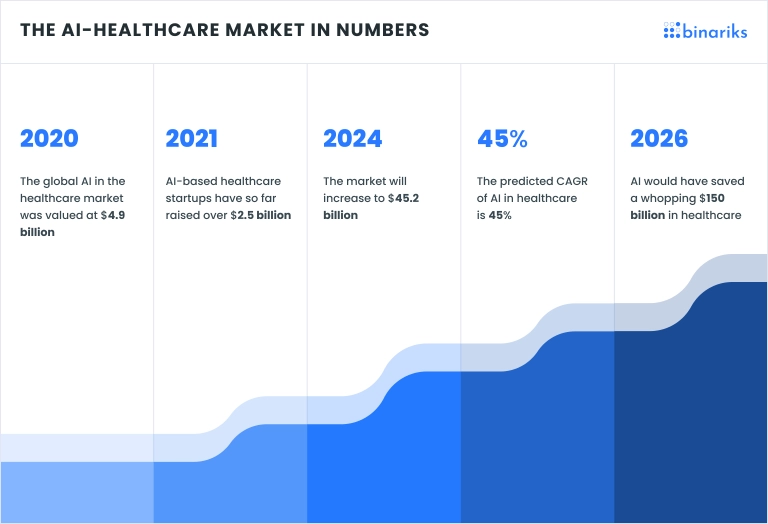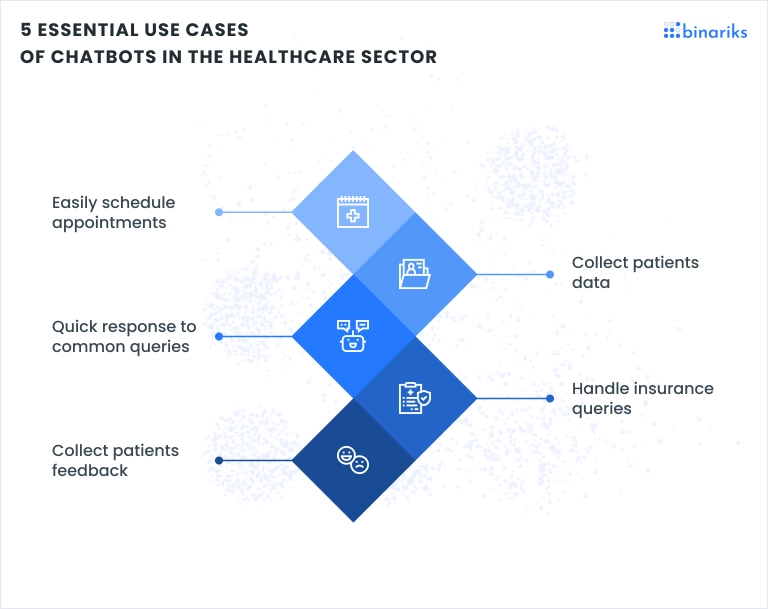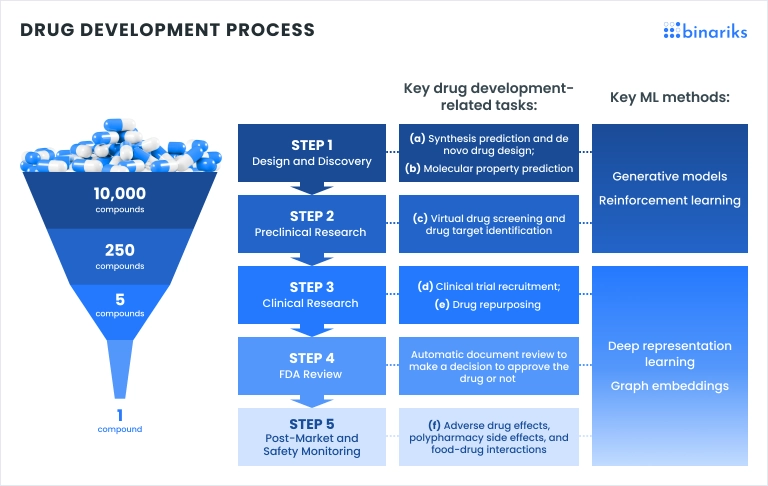Artificial Intelligence has been transforming a variety of industries, and healthcare is no exception. Most medical organizations are striving to maximize advantages of using AI in healthcare. AI adoption statistics show that 35% of companies are already using AI in their daily work, and 42% are considering its future adoption (source ).
Benefits of AI in healthcare can change the whole perception of treatment. It can automate daily tasks, reduce human errors, and improve patients’ experience. AI can save a lot of time and money for medical companies. And there are already many successful examples of how AI helps clinicians improve their performance.

Along with this, of course, there's no denying that there are both pros and cons of AI in healthcare. In particular, software engineers and healthcare providers should prioritize and address data privacy and regulatory compliance challenges of using AI for healthcare purposes.
In Binariks, we solve such problems. We offer comprehensive assistance in implementing and integrating AI technologies into the medical business. Binariks can help with AI solutions planning, design, and development, data security compliance, AI systems integration into existing software, and more.
In this article, we'll try to take a comprehensive look at AI's impact on the healthcare industry, considering real-world use cases, risks, and prospects. Yet first, let's see what are the benefits of AI in healthcare and how they make this paradigm shift worth it.
Cost reductions
Artificial Intelligence can shift the whole healthcare model from reactive to proactive approach. Algorithms can analyze large amounts of medical data to predict potential diseases. Combining all the results, AI can improve diagnostic accuracy and build personalized treatment plans. AI algorithms also predict errors and assess patient-specific risks, which saves a lot of money for hospitals and patients.
NetHealth estimated that patients cancel approximately 27% of all medical appointments in the US. One such meeting costs the hospital up to 200 dollars. They invented Missed Visit Prediction Indicator, which can calculate the risk of missing a medical appointment. This analytics tool is able to save around $150 billion per year, only by predicting who’s at risk of missing next appointments (source ).
Anticipating possible consequences can save health and cost of treatment. Algorithms can calculate predispositions to diseases and the impact of various factors on health. It also can prognose possible reactions to cure and warn about them. Patients can start treatment earlier and increase the chance of getting rid of diseases.
Improved accuracy and efficiency
Improved accuracy is the greatest benefit powered by AI for healthcare. Its algorithms allow analyzing a large amount of data quickly and precisely. They can extract valuable information from a variety of medical documents, including electronic medical records (EMRs), clinical records, and scientific literature.
Also, AI is able to detect patterns, connections, and insights in medical text and automates coding processes. For example, platforms like Linguamatics use NLP-based text mining solutions for analyzing medical documentation (source ).
This NLP platform can analyze every medical document: a patient's record, research literature or regulatory compliance. It also converts audio and video into text and highlights important theses. Insights, extracted from large amounts of data, speed clinical processes, optimize quality of care, and improve patient outcomes.
Another area where the greatest AI benefits in healthcare are accuracy and efficiency is administrative activities. Health professionals usually have plenty of repeating routines like appointment scheduling, billing , or claim processing. And AI algorithms can do them automatically.
Waystar has presented Hubble, an AI-powered revenue cycle management platform. It helps optimize billing processes in healthcare practices. Hubble can analyze medical records, identify appropriate codes, and ensure compliance with billing regulations. Using AI and machine learning algorithms, it identifies potential billing errors, automates claim submissions, and improves revenue capture (source ).
Improved decision-making
Rapid establishment of diagnosis is one of the challenges healthcare professionals face. One of AI benefits in healthcare is the reduction of time between the first consultation and diagnosis. AI can consider plenty of tiny details based on each patient's medical history for a primary diagnosis. It also takes risks into account and suggests treatments to minimize them.
Health tech company Regard has made their own AI co-pilot that embeds into medical records. It analyzes patients' information and suggests possible diagnoses. It also assists in giving recommendations for the treatment. Moreover, it automatically updates patients' documents, saving time for clinicians (source ).
Making personalized treatment plans is another example of how AI drives decision-making. Thus, AI algorithms can combine patient medical history, genetics, allergy-causing components in medicines, lifestyle, etc., and then analyze and interpret this data to give personalized treatment recommendations.
Besides, AI solutions allow for predicting the effectiveness of different treatment plans. For example, Edge, an AI platform by Tempus, was developed to analyze data from cancer patients by using machine learning and genomic sequencing. Edge helps identify the most suitable treatment options and predict the patient's response. All this enables the development of personalized treatment plans (source ).
Improved patient experience
The opportunity of providing round-the-clock support to patients also belongs to the benefits of artificial intelligence in healthcare.
Thus, chatbots can establish potential diagnoses and provide advice for further steps. When integrated with the right knowledge base, chatbots can collect data from patients and cross-reference their symptoms with their database, giving relevant insights and even assessing the urgency of a patient's symptoms.
A good example is Babylon, a chatbot from BabylonHealth that supports patients at home. This chatbot uses NLP to collect symptoms and give advice on what to do next. Moreover, it uses telemedicine and offers virtual consultations with healthcare professionals.

Also, AI and ML solutions help improve patients' experience with RPM . Med-tech company Biobeat has developed an AI-powered remote monitoring platform continuously collecting data from their plural wearable devices (source ).
These wearable monitors connect to a cloud-based patient management system and provide medical staff with real-time data. This solution also includes an integrated customizable early warning score system. It analyzes aggregated patient data to identify deterioration and provide predictive analytics.
Time saving
Lack of time is among the most common problems faced by patients and healthcare professionals. According to the 2022 survey, long waiting times is the biggest problem for adult patients in hospitals (source ).
Obviously, it is quite important to give treatment on time but the schedule of healthcare workers is often hectic. They overwork and feel emotional burnout more often than workers in other fields. Luckily, there are a lot of AI applications that can relieve valuable time for clinicians.
Cooperation of AI and healthcare offers time saving solutions for medical organizations management. It can enhance the effectiveness of operations by analyzing patient flows, resource usage, and operational patterns.
AI enables making fast decisions based on data, resulting in optimized allocation of resources. For instance, Notable Health offers an AI-driven project that automates administrative tasks in healthcare. It helps with registration and intake, scheduling, authorizations, referrals and billing.
Yet most importantly, timely decisions can save patients' lives. Every second counts when a patient has a stroke, so Viz.ai has developed Viz LVO , an AI-based technology that analyzes brain scans. This software automatically identifies potential large vessel occlusions associated with strokes. Viz LVO supports healthcare professionals to make fast decisions and provide prompt medical interventions (source).
Easy information sharing
Easy exchange of information is one of the undoubted advantages of AI in healthcare. AI enables healthcare professionals to share medical data, knowledge, and insights across different platforms and formats. Besides, AI applications can be integrated with EHRs and patients' wearable devices.
Of course, patients also benefit from seamless sharing of information. They can access their medical records and check information about lab results, appointment schedules, and recommendations. MyChart is a patient portal which allows them to view and share their medical information in a secure way (source). OpenAI GPT is integrated with the patients' cards and updates their information.
Patients can also provide feedback on hospitals and doctors they had experience with. PatientPop has an AI-powered software that gathers reviews. It uses sentiment analysis and NLP to analyze feedback. It counts every visitor's rate to give the opportunity for others to choose a hospital by its estimation (source ).
Some examples of AI in healthcare
AI in drug discovery
Inventing new medicine is a resource-intensive endeavor, and antibiotics are one of the most challenging formulas to invent. Additionally, bacteria quickly adapt to new antibiotic formulas and become resistant.
However, recently scientists have begun using AI to accelerate new antibiotics discovery. And now we know about Abaucin, an antibiotic that can kill resistant bacteria. It is currently in the test phase but already shows high potential (source ). If AI learns to quickly invent new formulas, it will play a leading role in overcoming antibiotic resistance in the future.

Medical imaging
Medical imaging encompasses a range of technologies used to examine the human body for detecting, monitoring, or treating medical conditions. AI is evolving medical imaging by reducing computing time for CT scans, enabling real-time inference on endoscopic cameras, and more. AI technologies streamline many processes in medical imaging and improve patient care.
Lab automation
Lab automation benefits from computer vision and other AI solutions ensuring fast and accurate test results. All this leads to faster patient diagnoses and quicker drug testing, fostering breakthroughs in pharmaceutical development.
AI-enabled robotics
AI-enabled robots are revolutionizing the medical field, enhancing not only surgical procedures, but supply delivery, disinfection, manual and repetitive tasks in laboratories, etc., allowing healthcare providers to focus on patient care. Besides, simulation platforms use AI and virtual reality for surgical training.
AI in precision medicine
Precision medicine leverages AI and genomic analytics to provide personalized care. AI-infused precision medicine tools accelerate research by harnessing advanced computation and inference techniques to generate valuable insights. This allows systems to reason and learn from data, leading to better decision-making and patient outcomes.
Challenges and future directions
To look at the big picture of medical AI, it’s important to see pros and cons of AI in healthcare. We described what are the benefits of using AI in healthcare. There are also challenges that should be clarified.
- Ensuring high data quality: To enable data analysis by AI algorithms, the data needs to be collected and standardized. These data should be specific and representative. Digitizing patient files has created a large dataset, but the target segments are still quite small. Therefore, data needs to be collected from different population segments and standardized.
- Integration and user acceptance: People still have biased attitudes against the cooperation of AI and healthcare. This tool is relatively new, and people usually trust the old and proven. There are social, ethical, and other factors that may form the patients' concerns.
- Preventing errors: If you deal with a large amount of data, you need to be ready for mistakes. Data gaps and inaccuracies also lead to errors. In addition, it is sometimes difficult to understand the causal relationships used by AI. It is necessary to have a clear vision of how AI determines such insights and gives such responses.
- Regulatory and compensation framework: The introduction of new healthcare technologies requires changes in many processes. The relevant regulations and policies are to be implemented, and hospitals should also establish some new rules for healthcare professionals and patients. It is necessary to determine the limits of AI responsibility, ensure privacy and standardize AI algorithms used in this industry.
- Ensuring data privacy and security: Both AI technology and personal data must be protected. HIPAA assists in using sensitive data by AI in the US, while protecting it. And in Europe, the General Data Protection Regulation (GDPR) protects personal data, at the same time, making it extremely difficult to share for AI development. So, leveraging AI in healthcare still needs more specific rules.
Given all the above issues, for now, the most promising prospect for AI in healthcare is hybrid models. They can improve the efficiency of diagnosis, assist with treatment planning or identifying risk factors. By incorporating such models, hospitals can adopt AI technology more rapidly. Furthermore, this approach would begin to yield measurable enhancements in both patient outcomes and operational efficiency on a larger scale.
Binariks and AI solutions for healthcare
At Binariks we consider the pros and cons of AI in healthcare to ensure the greatest benefit to our partners. We have solid expertise in the health tech market and can support implementing AI applications in medical businesses.
- Solution development. We can get involved at any stage of development or build an AI application from scratch. Binariks has experience in building AI solutions according to the organization's needs.
- Data management. We have a team of data engineers able to build data management solutions. They can assist in building secure warehouses for further data analysis and operations.
- Cloud services. Big data solutions leverage cloud computing to be more scalable and flexible. By using cloud infrastructure in data applications, our experts guarantee their stability in conditions of constant data growth.
- Security and Compliance. Binariks has experience with HIPAA regulations and builds trustful AI-powered solutions. Our engineers can implement necessary security measures to protect sensitive patient data.
- Quality assurance and training. Our QA team can test AI applications to check and ensure their reliability and safety. Moreover, Binariks can train healthcare professionals for effective integration of AI tools in their daily work.
- Maintenance and improvement. Binariks can support completed AI solutions and improve them. It is essential to keep AI-powered applications up-to-date because of its continuous development. We can implement new updates and get the most pros of AI in healthcare.
Final thoughts
Despite all the challenges, there are huge benefits of using AI in healthcare.
AI gives a lot of opportunities for healthcare professionals and supports them. Patients can get more qualified treatment most easily. Medical AI is reshaping the way hospitals and clinics work. Early diagnostics, remote medicine, and AI-powered treatments can save people's lives.
AI algorithms help manage huge medical enterprises and local hospitals and clinics. Moreover, AI provides patients in developing countries with access to professional treatment. Data science technologies can potentially assist in solving global problems, and we already observe some of such first signs. Overcoming antibiotic resistance could be one of the crucial benefits of artificial intelligence in healthcare.
Finally, AI is continuously learning and teaching itself. Self-learning and training on its own mistakes are great AI pros, even though there is still a possibility of errors in its algorithms. AI is a powerful tool, and people are learning how to make the best use of it every day.
FAQ
Share

